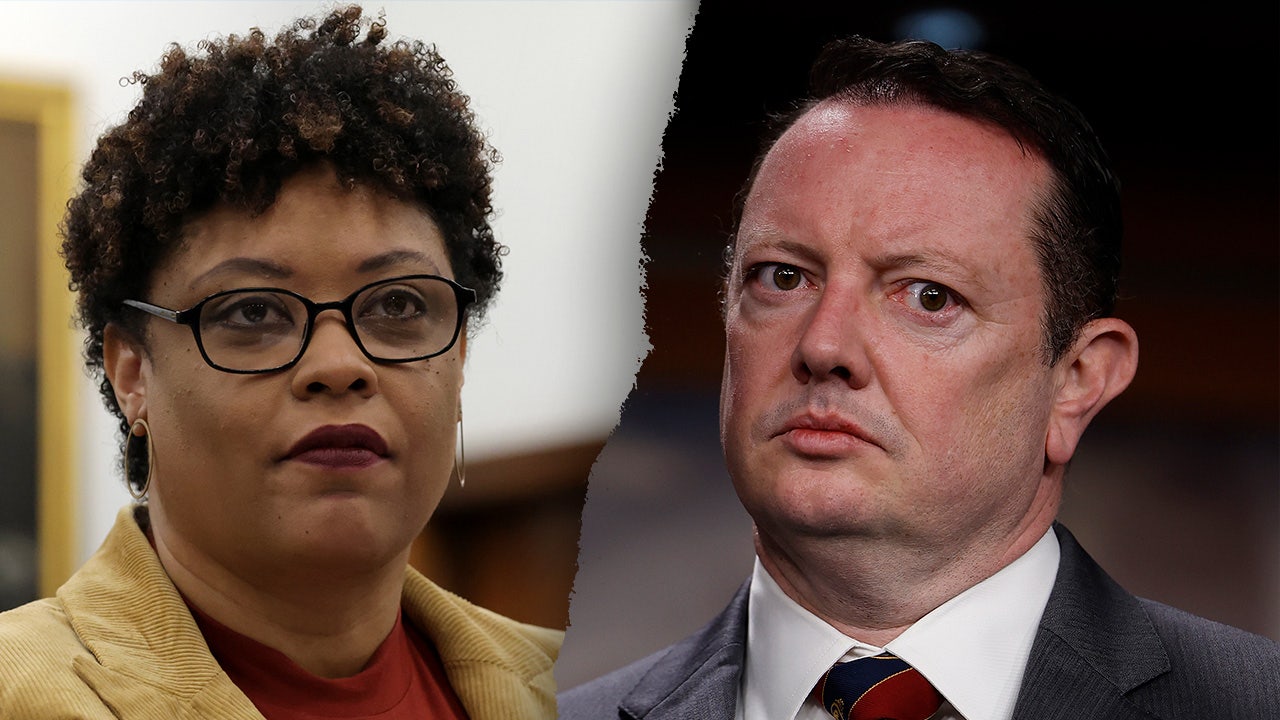Montana
On second thought: Montana Supreme Court decides not to give attorneys' fees to groups • Daily Montanan

As tensions between two of three Montana branches of government continue to simmer, the Montana Supreme Court reconsidered its position on awarding attorneys’ fees in a case of unconstitutional laws brought by the 2021 Legislature. And, it essentially overturned itself, this time agreeing not to award attorneys’ fees.
It is a rare example of the state’s highest court rehearing a matter it had decided, and late last week, the court fractured into at least four distinct camps on the case, which not only dealt with attorneys’ fees, but also examined the powers of the the Montana University System Board of Regents and the Montana Legislature.
The group consisted of 15 people or groups, including the Montana Federation of Public Employees, the state’s largest union, the Faculty Senate of Montana State University and Mae Nan Ellingson, one of the living original members of the 1972 Constitutional Convention. They had originally sued for a declaration that House Bill 349, 112, 102 and portion of Senate Bill 319 were illegal. They all dealt with higher education in some form, although those bills, which have been struck down, were not the basis of the Supreme Court decisions.
The new decision comes as Montana Senate Republicans launch a committee that is looking at ways to reshape the state’s judiciary. A similar committee was convened in 2021 by Republican leaders in the Legislature, and was the topic of heated political disagreements as the Republicans charged the state’s courts were both opaque and overstepping their boundaries. Meanwhile, Democrats defended the courts, saying they were simply doing their job, evaluating new laws against the state’s Constitution.
The new committee is comprised of Republican lawmakers, and Democrats have vowed to boycott the proceedings.
On Friday, the Montana Supreme Court changed course and decided against awarding attorneys’ fees to groups that brought a suit contending that four bills violated the Montana Constitution. All three of the bills were struck down by a Gallatin County District Court judge, and some of the court’s decision was appealed. However, upon re-examination, the Supreme Court sided with the district court that the Legislature’s actions had overstepped the constitutional provision that gives the Montana University Board of Regents administrative and policy power over the public universities and colleges.
Much of the Supreme Court’s very divided opinion didn’t deal with the subjects of the lawmakers’ bills, which were found to be unconstitutional; rather the high court pivoted to whether a group of university students and professors had the power to bring the lawsuit, and whether they were entitled to recouping attorneys’ fees.
When the Supreme Court originally decided the case, it overturned district court Judge Rienne McElyea’s decision not to award attorney’s fees. The Supreme Court previously argued that because the district court had said the laws were brought in bad faith, meaning the Legislature should have known they violated the Constitution, the groups’ were entitled to attorneys’ fees.
However, upon reconsideration, the Supreme Court was unable to come to enough of a consensus to obtain agreement on the issue of attorneys’ fees, so McElyea’s original decision stands; that means the groups will no longer get attorney’s fees from the state.
On second thought…
The Supreme Court’s decision was one of the more complex decisions, with justices agreeing and disagreeing with each other simultaneously. Five of the seven justices said the groups that originally filed the lawsuit had legal standing to do so.
Meanwhile, Justices Jim Rice and Dirk Sandefur disagreed, in part, saying that the lawsuit should have been brought by the Montana University Board of Regents because they are charged, by the Montana Constitution, with oversight and administration of the university system. They reasoned that if laws passed by the Legislature were problematic, it should have been the regents who responded.
Other justices said that because university students, staff and professors would be affected by the laws that they had legal standing to bring the lawsuit.
“The Board (of Regents)’s failure to initially challenge the subject legislation for whatever reason and its intervening prolonged inaction overwhelmingly demonstrate the necessity for private enforcement,” said Justice Ingrid Gustafson, who wrote parts of the opinion. “The actual student plaintiffs here, who were threatened with actual discrimination, cannot be forced to wait indefinitely for the board to assert its own independence.”
Arguably the most consequential portion of the ruling centered on the issue of attorneys’ fees. Ultimately, the high court ruled that while Montana state law allows attorneys’ fees to be awarded to groups or individuals that successfully sue the government for unconstitutional laws, under a legal theory known as the “private attorney general doctrine,” those fees are discretionary, not mandatory.
The court then reconsidered the findings of McElyea, and some justices reasoned that while there were several points that could have triggered an attorneys’ fees award, it was discretionary so the finding of lower court should be upheld.
However, in the opinion written by Justice Gustafson, and joined by Laurie McKinnon, both said that they still found that not only had the Legislature acted in bad faith when passing the laws, but that it could be argued that the Board of Regents should have fought back against the Legislature’s encroachment on their authority. Furthermore, the groups should be awarded the attorneys’ fees for essentially having to do someone else’s job.
“While we need not make a judicial determination of bad faith in this case, there are indications where one could question whether the state was not entirely acting in good faith by defending all of the bills at issue here. One such indication is that the state did not even brief any merits defense for two of the three challenged bills after the district court declared them unconstitutional. Yet the state, in its zeal to impose unconstitutional legislative enactments against the board and the Montana University System, continue to assert the plaintiffs could not even bring the claim against those laws the state concedes are unconstitutional.”
They also argued that the groups should be awarded attorneys’ fees for actually vindicating rights found in the Montana Constitution, namely those of the Board of Regents’ and its authority over the university system.
“Attorney fees are proper because of the process through which the unconstitutional bills came to be: Patently unconstitutional bills adopted through the willful disregard of constitutional obligation,” the Gustafson-McKinnon opinion said. “Assessing fees when plaintiffs successfully challenge legislation which came about through such unconstitutional means may serve to deter wrongdoing in the first place.”
Meanwhile, Chief Justice Mike McGrath and Justices Beth Baker and James Jeremiah Shea said that while the court could have awarded attorneys fees, that there are many factors that could have triggered the award, and the court would not second-guess the district court because the award is not mandatory.
“As noted by the district court, there was an independent entity of state government here who could have enforced its constitutional authority — the Board of Regents. The board is often willing and able to defend its constitutional authority. Plaintiffs here did not make the necessary showing that the board was unwilling or able, for whatever reason, to challenge these laws,” McGrath wrote.
Finally, Sandefur and Rice didn’t discuss the merits of the case or attorneys’ fees because they argued that the group shouldn’t have legal standing in the case, and that the only group with standing was the Board of Regents.
“Such decisions are inherent to the ‘full power, responsibility, and authority to supervise, coordinate, manage and control the Montana University System,’ and necessarily should be made exclusively by the board itself, not by an amorphous group of surrogates,” said Rice and Sandefur.
Reversal attorneys fees

Montana
Q&A: Roger Roots, Libertarian Candidate for Clerk of the Montana Supreme Court

We are gathering information from all statewide candidates as a resource for the 2024 Primary Elections. Responses were limited to 200 words per question. Political attacks may have been removed, but otherwise, the responses are published unedited.
What is your full name, as it will appear on the ballot?
Roger Roots
What is your age?
56
Where do you live?
Livingston, MT
What is your education background?
High school dropout. B.S. Sociology, MSU-Billings. J.D. & M.C.J., Roger Williams University (Rhode Island); Ph.D., Sociology, UNLV.
Please list your current and previous occupations.
Currently a criminal defense lawyer. Formerly a professor of criminal justice and sociology. Also founder of Lysander Spooner University.
What motivated you to seek the office of Clerk of the Supreme Court ?
Intrusive, expansive government is the greatest threat faced by all mankind. Government is the greatest source of danger and violence in the lives of most people on earth. Governments murdered at least 70 million of their own people during the 20th century; and probably many more. [EDITOR’S NOTE: MTPR could not find evidence supporting this claim.] Since the late 1990s I have been an active Libertarian, seeking to educate and alert people to the evils of government.
What experience do you have in filing, storing or managing court records?
I have been an active lawyer since 2003 and am quite familiar with court clerical duties and operations.
What role does partisanship play in the office of Clerk of the Supreme Court?
It shouldn’t play much role at all. As clerk of the Supreme Court, I will always look out for the freedoms of the people of Montana as my highest priority.
Do you think there are ways the office of Clerk of the Supreme Court can improve?
Yes. There are times the Clerk must act as a check on the Supreme Court itself. As Clerk I will make sure the Court is always open for the people’s grievances.
What role should the Clerk play in the operations of the Montana Supreme Court?
The most important role is smoothness and efficiency. The Clerk must also act to protect Montana citizens from the Court, at times. The Clerk must, of course, serve the justices; but first and foremost he must serve the people of Montana.
Montana
Montana’s First Congressional District candidates: Dennis Hayes

BOZEMAN — Continuing our look at candidates for Montana’s Western Congressional District, we meet a Bozeman man running on the Libertarian ticket. MTN’s Kristin Merkel introduces us to Dennis Hayes.
“Because of all the corruption that’s in this government and in the court system, the Forest Service, the BLM—there is too much corruption and too much stealing American taxpayers money.” — Dennis Hayes
Libertarian Congressional candidate Dennis Hayes from Tulsa, Oklahoma is running for a spot in Congress to investigate what he believes is corruption from several organizations and government entities.
“I’m going in to start investigating the Forest Service. I’m going to investigate the BLM. I want to investigate the court system, because I’ve been to court on this, and I’ve seen how corrupt the court systems are,” Hayes said. “And even with the illegals and stuff, this government is giving our money away to illegals and to different countries, and they don’t have the right to do that.”
See more MTN interviews with the candidates in Montana’s First Congressional District race:
Hayes says his campaign strategy is all word of mouth.
“Free publicity—I’m on Social Security, don’t have any money. I’ve had people wanting me to run, so that’s why I’m running. Because I’m a small minor, and I’ve been having problems with the Forest Service on their corruption and the corruption of the BLM.”
The primary election for the Congressional seat is on June 4.
The Libertarian ballot also has Ernie Noble listed as a candidate. MTN News was scheduled to interview him, but he did not show and has not returned our calls.
Election website Ballotpedia has him listed as unofficially withdrawn, but according to the Montana Secretary of State, he has not withdrawn through its office.
Montana
Public charter schools in Montana set to open, related legislative tweaks possible • Daily Montanan

The Montana Legislature may consider “minor” changes to statutes related to public charter schools during its 2025 session following a recent court order, said a legislator and chairperson of an education committee.
But 18 schools are slated to open this year, according to the Office of Public Instruction.
Rep. Dave Bedey, R-Hamilton, said Thursday he believes the bill that opened the door for more charters is clear as written.
“At the end of the day, I’m just gratified that schools across the state are going to be able to put these innovative programs into place without delay,” Bedey said.
In the 2023 session, the legislature approved House Bill 549, which eased the way for more charter schools through the public school system. However, a lawsuit filed this spring alleged the Office of Public Instruction was throwing up roadblocks.
Last month, a Lewis and Clark District Court judge disagreed with the Office of Public Instruction’s interpretation that certain prerequisites needed to be met to get the charter schools off the ground, such as a parental petition and approval from county commissioners.
The legal dispute took place as students made plans to attend the new schools, but educators alleged the argument over how to open them meant likely delays.
Last week, the court signed off on an agreement between the plaintiffs, the Montana Quality Education Coalition, and defendants, Superintendent Elsie Arntzen and the Office of Public Instruction, that resolves some of the fight.
In the stipulation, the Montana Quality Education Coalition agreed Arntzen and the OPI had implemented processes that allow the schools to start operating by July 1, 2024, and that they were in compliance with the court’s order for a preliminary injunction last month.
Court order
“IT IS HEREBY ORDERED THAT this Court’s Preliminary Injunction Order, dated April 17, 2024, remains in effect pending an order terminating this Court’s preliminary injunction or until the Montana Legislature has the opportunity during the 2025 session to amend relevant statutory authority regarding the responsibilities of the Board of Public Education, the Office of Public Instruction, and the Superintendent of Public Instruction relative to the authorization of and opening of public charter schools in Montana. The remaining claims for declaratory and permanent injunctive relief are dismissed with prejudice and with each party bearing responsibility for their own attorney’s fees and costs.” — Order from Lewis and Clark District Court
The Montana Quality Education Coalition describes itself as made up of more than 100 school districts and five education organizations and one of the largest education advocacy organizations in Montana.
The agreement the judge approved acknowledges the preliminary injunction from April 17 remains in effect unless the court terminates it or the legislature amends relevant statutes. It also dismisses outstanding claims.
In an email this week, the Office of Public Instruction notes that as of May 13, it had opened 15 of 18 schools enrolling students this year.
“The OPI is working with one school to correct some of the information that was submitted and is waiting on applications from two schools,” the agency said in an email. “One of the approved public charter schools will not open until the fall of 2025.”
Rep. Bedey, chairperson of the interim budget committee on education, said Thursday he doesn’t believe amendments are needed, although small changes are possible.
Rather, he said a plain reading of HB 549 clearly indicates the approval process for schools, the authority of the Board of Public Education, and the duty of the Office of Public Instruction.
All the same, Bedey said the legislature has an opportunity to make “some minor changes” to make the intentions of the bill “crystal clear and remove any ambiguity” given some people had a “contrary reading” of it.
At a committee meeting in March, legislators voted 6-2 to send a letter to Arntzen telling her she was failing students and not meeting her Constitutional duties related to HB 549 and other educational programs legislators had supported.
The Montana Quality Education Coalition filed the lawsuit later the same month.
“It’s regrettable that this issue had to go to the courts for resolution because the meaning of the law was clear,” Bedey said. “It’s regrettable that we were unable to convince the superintendent of that when her lawyer appeared before us in a committee meeting in March.”
-

 Politics1 week ago
Politics1 week ago'You need to stop': Gov. Noem lashes out during heated interview over book anecdote about killing dog
-

 Politics1 week ago
Politics1 week agoRFK Jr said a worm ate part of his brain and died in his head
-

 World1 week ago
World1 week agoPentagon chief confirms US pause on weapons shipment to Israel
-

 World1 week ago
World1 week agoConvicted MEP's expense claims must be published: EU court
-

 Politics1 week ago
Politics1 week agoCalifornia Gov Gavin Newsom roasted over video promoting state's ‘record’ tourism: ‘Smoke and mirrors’
-

 News1 week ago
News1 week agoStudents and civil rights groups blast police response to campus protests
-

 Politics1 week ago
Politics1 week agoOhio AG defends letter warning 'woke' masked anti-Israel protesters they face prison time: 'We have a society'
-

 Politics1 week ago
Politics1 week agoBiden’s decision to pull Israel weapons shipment kept quiet until after Holocaust remembrance address: report


















